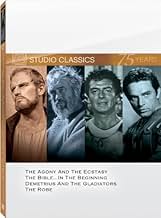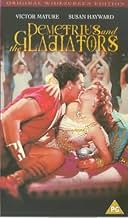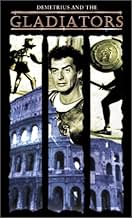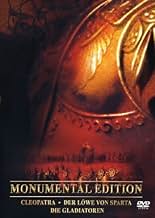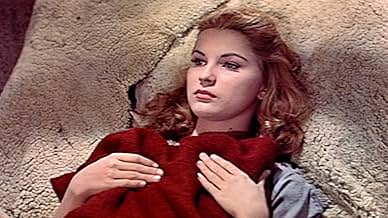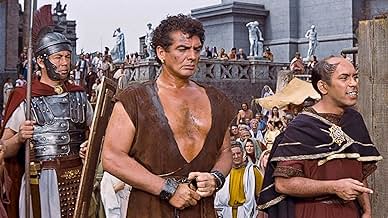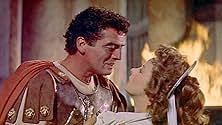Dans la Rome du premier siècle, l'esclave chrétien Démétrius est envoyé se battre dans l'arène des gladiateurs et l'empereur Caligula cherche la robe de Jésus pour ses prétendus pouvoirs mag... Tout lireDans la Rome du premier siècle, l'esclave chrétien Démétrius est envoyé se battre dans l'arène des gladiateurs et l'empereur Caligula cherche la robe de Jésus pour ses prétendus pouvoirs magiques.Dans la Rome du premier siècle, l'esclave chrétien Démétrius est envoyé se battre dans l'arène des gladiateurs et l'empereur Caligula cherche la robe de Jésus pour ses prétendus pouvoirs magiques.
- Réalisation
- Scénario
- Casting principal
- Soldier
- (non crédité)
- Gladiator
- (non crédité)
- Cousin
- (non crédité)
- Gladiator
- (non crédité)
- Varus
- (non crédité)
- Gladiator
- (non crédité)
- Guard-Escort of Prisoners
- (non crédité)
Avis à la une
In the title role Victor Mature is upped to star billing, with Jay Robinson's very mad Caligula ("why should I suffer death like any plebeian?") and Michael Rennie as St. Peter returning from the earlier film. New additions to the cast include Barry Jones, who gives the thing gravitas as Claudius, and Ernest Borgnine and black American actor William Marshall in dignified supporting roles. (It also has a strong female contingent led by Susan Hayward's haughty, flame-haired Messalina who boasts that "my claws are sharper than the tiger's"; with Anne Bancroft in a small part and even an unbilled Julie Newmar shaking those hips as a dancing girl.)
The most decisive piece of casting, however, is director Delmer Daves, who just rolls up his sleeves and gets stuck into delivering all this nonsense with gusto.
The central character, Demetrius, is a former slave who, after assaulting a soldier who is molesting his girlfriend Lucia, is sentenced to fight in the arena as a gladiator. This causes him difficulties as he is a Christian whose moral code will not permit him to kill another man, even in self-defence. He survives, however, largely because he attracts the attention of Messalina, the wife of Claudius, uncle of the Emperor Caligula. Later, believing that Lucia has accidentally been killed by another gladiator, Demetrius renounces his Christian faith, and fights fiercely, killing the man he believes to have been responsible for her death and several others. His courage and skill with a sword lead to his being made a tribune in the Praetorian Guard, and he becomes Messalina's lover. As in "The Robe", the robe which Christ wore to His crucifixion plays an important part in the film; Caligula wants to get his hands on it because he believes that it has magical powers and that it will give him the secret of eternal life.
Several of the epics of this period combined, incongruously, an improving religious message with a good deal of eroticism, with much bare female flesh on display- examples include "Solomon and Sheba", "Esther and the King" and "Salome", where we get to see the famous dance of the seven veils, but it is made clear that, contrary to the Biblical version of the story, Rita Hayworth's character is in fact a virtuous heroine who only is flashing her legs in public in a desperate attempt to save John the Baptist from his fate. There are elements of this strange combination of godliness and sexiness in "Demetrius", but the sexiness is very much downplayed. Messalina's notorious promiscuity is alluded to rather than shown on screen, and the scene between the gladiators and the women brought in to entertain them may be an orgy, but it is a very decorous one. The film-makers were clearly more interested in the element of godliness, and, unlike some films of this type, "Demetrius" raises genuine moral issues about pacifism, non-violence and Christian forgiveness.
Demetrius himself is a man who goes through a crisis of faith and abandons his Christian beliefs in favour of an ethic based on revenge and worldly ambition. His conscience, however, is troubled, especially after he is reproached by his old friend St Peter. He is a more complex and interesting figure than many epic heroes, so it is unfortunate that the part was played by Victor Mature, an actor whose success often seemed to owe more to his ruggedly masculine good looks and his virile physique than to his acting technique. Susan Hayward (an actress who could often look bored and listless when asked to play roles that did not interest her) makes a weak Messalina. Neither give their worst performance (in Hayward's case that must surely have been "The Conqueror"), and Mature brings a certain rough sincerity to his part, but I felt that the film might have been improved with other actors in these roles.
Nevertheless, there was much I enjoyed about the film. Michael Rennie was appropriately dignified as Peter, played as a sort of ascetic philosopher, although I would agree with the reviewer who pointed out that it would be hard to imagine him ever working as a fisherman. I also liked William Marshall as Glycon, the former African king now forced to fight as a gladiator, who befriends Demetrius. ("Spartacus", a better film than "Demetrius" although it owes something to it, also features a sympathetic black gladiator who befriends the hero).
Jay Robinson, who played Caligula, has been criticised by some reviewers for overacting, although I must say I liked his performance. Historians have doubted whether the real Caligula was actually insane, although he was undoubtedly cruel and eccentric, but in the context of this film he is definitely presented as a lunatic, a man who has literally been driven mad by power to the point where he believes himself to be a god. (Not even Hitler went that far). There is an interesting contrast with a modern epic, "Gladiator", in which Joaquin Phoenix plays another tyrannical Roman Emperor, Commodus, as a basically weak and insecure young man. Although Phoenix's performance works well in the context of that particular film, the way the role of Caligula was written called for something quite different- the sort of ranting, over-the-top performance which might be unfashionable now but would have been less controversial in the fifties.
Although the standard of the acting is mixed, I generally enjoyed the film. It does not reach the standard of the really great epics, such as "Spartacus" or "Ben-Hur", but it works well on the level of spectacle, with fine sets and costumes and some exciting scenes of gladiatorial combat, and has a more intelligent script than many epics. 7/10
The performances of the cast, especially the minor characters, was excellent, although Mature was still awfully stiff in his performance. But a good sequel over all.
Following straight on from The Robe, Demetrius and the Gladiators is a safe and enjoyable Biblical picture that doesn't outstay its welcome. Running at just over 100 minutes, the film is far from being epic in its telling. However, and without cramming in, it does contain all the necessary ingredients to make up a sweaty sword and sandals pie. Filmed in CinemaScope it has a persecuted hero, a bonkers villain, a sexy babe, huge sets, colourful costumes and fights, lots of fights. Thankfully the serious dialogue is mostly kept brief, as there a few things worse in this genre of film than bloated discourse on religious beliefs and political dalliances. Just get in there, let us know what is going on, and move on to the next chapter of the story. This is something that Daves' film does very well, it has an eagerness to entertain with dots of gusto and sexual swagger. The acting is mixed, Mature is solid without ever really convincing as the heroic figure of Demetrius, Hayward and Robinson are camping it up and thus entertain royally, while Borgnine and Rennie earn their respective pay.
Very much like another Phillip Dunne screenplay genre piece, David And Bathsheba, this one is often overlooked or forgotten in discussion about the sword & sandals genre. That both films are not in the same league as the likes of Ben-Hur and Spartacus is a given, but both have much to offer the discerning cinephile. So this one is recommended Sunday afternoon fare with a flagon of claret and a roast ox dinner. 7/10
Le saviez-vous
- AnecdotesThe set of the Christian neighborhood in Rome has previously been used in La tunique (1953) (of which this film is the sequel) as the village of Cana. We can easily recognize the well with old broken columns.
- GaffesWhilst Caligula (Jay Robinson) is talking to Claudius and Messalina about the death of Marcellus and Diana, he draws a dagger and plays with Claudius by threatening to stab him with it. When he puts it back in its sheath, sheath and dagger inadvertently turn upside down sticking out at an odd angle and irritating Jay Robinson, who tries twice and finally rights the sheath at his waist.
- Citations
Demetrius: We traveled here together from Galilee, persuading people to give up their lives for a beautiful dream.
[he attempts to hand a goblet of wine to Peter]
Demetrius: Take it Peter. It's real... hot spiced, with cinnamon and cloves.
[chuckles and looks towards Messalina]
Demetrius: Did you know that Jesus could turn water into wine? And that was only one of his tricks.
Peter: Yes, only one. Anything that was base, He could make noble. He found a leper and made him clean. He found death and He made life. He found you a slave, and He made you free.
Demetrius: Get out!
Peter: And now you've won a great victory over Him, haven't you tribune ? You've made yourself a slave again.
- ConnexionsFeatured in Miss Cobaye (1992)
Meilleurs choix
- How long is Demetrius and the Gladiators?Alimenté par Alexa
Détails
Box-office
- Budget
- 4 500 000 $US (estimé)
- Montant brut mondial
- 11 911 $US
- Durée1 heure 41 minutes
- Rapport de forme
- 2.55 : 1
Contribuer à cette page



